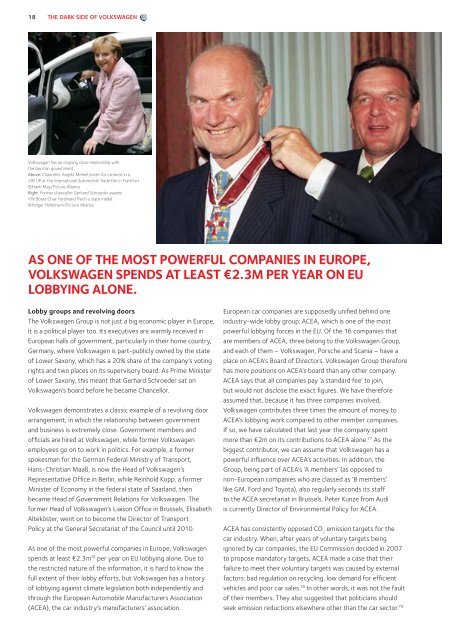The Dark Side of Volkswagen - Greenpeace
The Dark Side of Volkswagen - Greenpeace
The Dark Side of Volkswagen - Greenpeace
You also want an ePaper? Increase the reach of your titles
YUMPU automatically turns print PDFs into web optimized ePapers that Google loves.
18 THE DARK SIDE OF VOLKSWAGEN<br />
<strong>Volkswagen</strong> has an ongoing close relationship with<br />
the German government:<br />
Above: Chancellor Angela Merkel poses for cameras in a<br />
VW UP at the International Automobile Trade Fair in Frankfurt.<br />
©Frank May/Picture Alliance<br />
Right: Former chancellor Gerhard Schroeder awards<br />
VW Board Chair Ferdinand Piech a state medal.<br />
©Holger Hollemann/Picture Alliance<br />
AS onE oF ThE MoST powERFUl CoMpAniES in EURopE,<br />
VolKSwAgEn SpEndS AT lEAST ¤2.3M pER YEAR on EU<br />
lobbYing AlonE.<br />
lobby groups and revolving doors<br />
<strong>The</strong> <strong>Volkswagen</strong> Group is not just a big economic player in Europe,<br />
it is a political player too. Its executives are warmly received in<br />
European halls <strong>of</strong> government, particularly in their home country,<br />
Germany, where <strong>Volkswagen</strong> is part-publicly owned by the state<br />
<strong>of</strong> Lower Saxony, which has a 20% share <strong>of</strong> the company’s voting<br />
rights and two places on its supervisory board. As Prime Minister<br />
<strong>of</strong> Lower Saxony, this meant that Gerhard Schroeder sat on<br />
<strong>Volkswagen</strong>’s board before he became Chancellor.<br />
<strong>Volkswagen</strong> demonstrates a classic example <strong>of</strong> a revolving door<br />
arrangement, in which the relationship between government<br />
and business is extremely close. Government members and<br />
<strong>of</strong>ficials are hired at <strong>Volkswagen</strong>, while former <strong>Volkswagen</strong><br />
employees go on to work in politics. For example, a former<br />
spokesman for the German Federal Ministry <strong>of</strong> Transport,<br />
Hans-Christian Maaß, is now the Head <strong>of</strong> <strong>Volkswagen</strong>‘s<br />
Representative Office in Berlin, while Reinhold Kopp, a former<br />
Minister <strong>of</strong> Economy in the federal state <strong>of</strong> Saarland, then<br />
became Head <strong>of</strong> Government Relations for <strong>Volkswagen</strong>. <strong>The</strong><br />
former Head <strong>of</strong> <strong>Volkswagen</strong>’s Liaison Office in Brussels, Elisabeth<br />
Alteköster, went on to become the Director <strong>of</strong> Transport<br />
Policy at the General Secretariat <strong>of</strong> the Council until 2010.<br />
As one <strong>of</strong> the most powerful companies in Europe, <strong>Volkswagen</strong><br />
spends at least ¤2.3m 76 per year on EU lobbying alone. Due to<br />
the restricted nature <strong>of</strong> the information, it is hard to know the<br />
full extent <strong>of</strong> their lobby efforts, but <strong>Volkswagen</strong> has a history<br />
<strong>of</strong> lobbying against climate legislation both independently and<br />
through the European Automobile Manufacturers Association<br />
(ACEA), the car industry’s manufacturers’ association.<br />
European car companies are supposedly unified behind one<br />
industry-wide lobby group: ACEA, which is one <strong>of</strong> the most<br />
powerful lobbying forces in the EU. Of the 16 companies that<br />
are members <strong>of</strong> ACEA, three belong to the <strong>Volkswagen</strong> Group,<br />
and each <strong>of</strong> them – <strong>Volkswagen</strong>, Porsche and Scania – have a<br />
place on ACEA’s Board <strong>of</strong> Directors. <strong>Volkswagen</strong> Group therefore<br />
has more positions on ACEA’s board than any other company.<br />
ACEA says that all companies pay ‘a standard fee’ to join,<br />
but would not disclose the exact figures. We have therefore<br />
assumed that, because it has three companies involved,<br />
<strong>Volkswagen</strong> contributes three times the amount <strong>of</strong> money to<br />
ACEA’s lobbying work compared to other member companies.<br />
If so, we have calculated that last year the company spent<br />
more than ¤2m on its contributions to ACEA alone. 77 As the<br />
biggest contributor, we can assume that <strong>Volkswagen</strong> has a<br />
powerful influence over ACEA’s activities. In addition, the<br />
Group, being part <strong>of</strong> ACEA’s ‘A members’ (as opposed to<br />
non-European companies who are classed as ‘B members’<br />
like GM, Ford and Toyota), also regularly seconds its staff<br />
to the ACEA secretariat in Brussels. Peter Kunze from Audi<br />
is currently Director <strong>of</strong> Environmental Policy for ACEA.<br />
ACEA has consistently opposed CO 2 emission targets for the<br />
car industry. When, after years <strong>of</strong> voluntary targets being<br />
ignored by car companies, the EU Commission decided in 2007<br />
to propose mandatory targets, ACEA made a case that their<br />
failure to meet their voluntary targets was caused by external<br />
factors: bad regulation on recycling, low demand for efficient<br />
vehicles and poor car sales. 78 In other words, it was not the fault<br />
<strong>of</strong> their members. <strong>The</strong>y also suggested that politicians should<br />
seek emission reductions elsewhere other than the car sector. 79

















